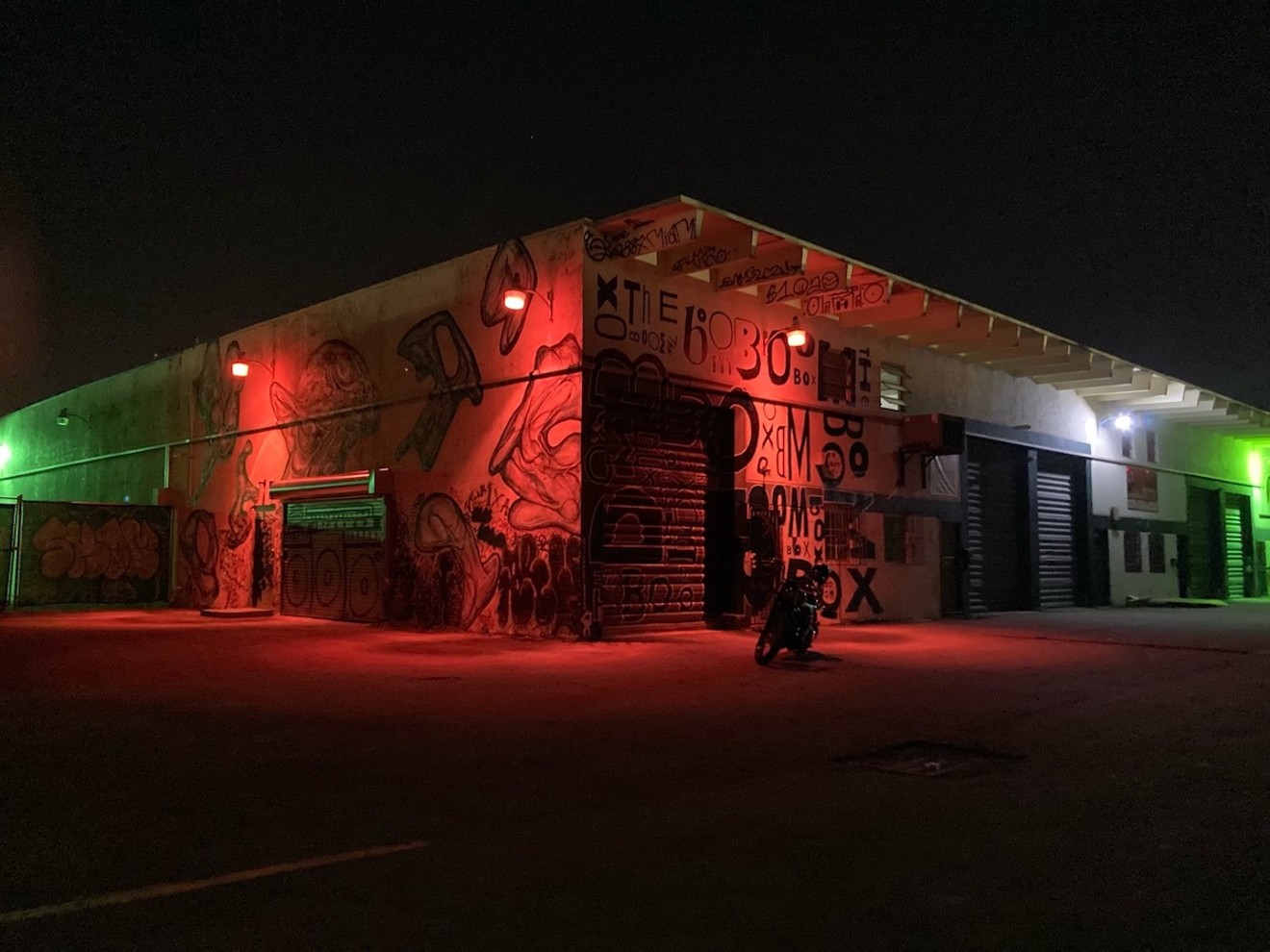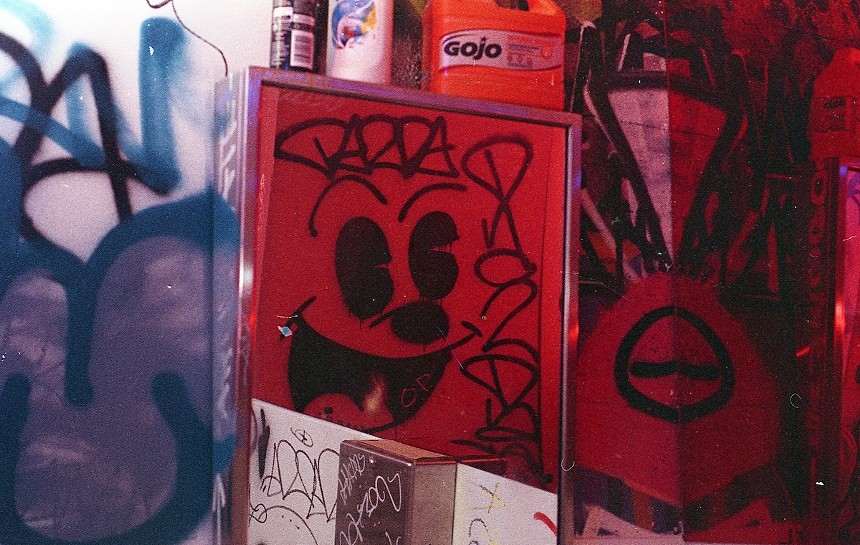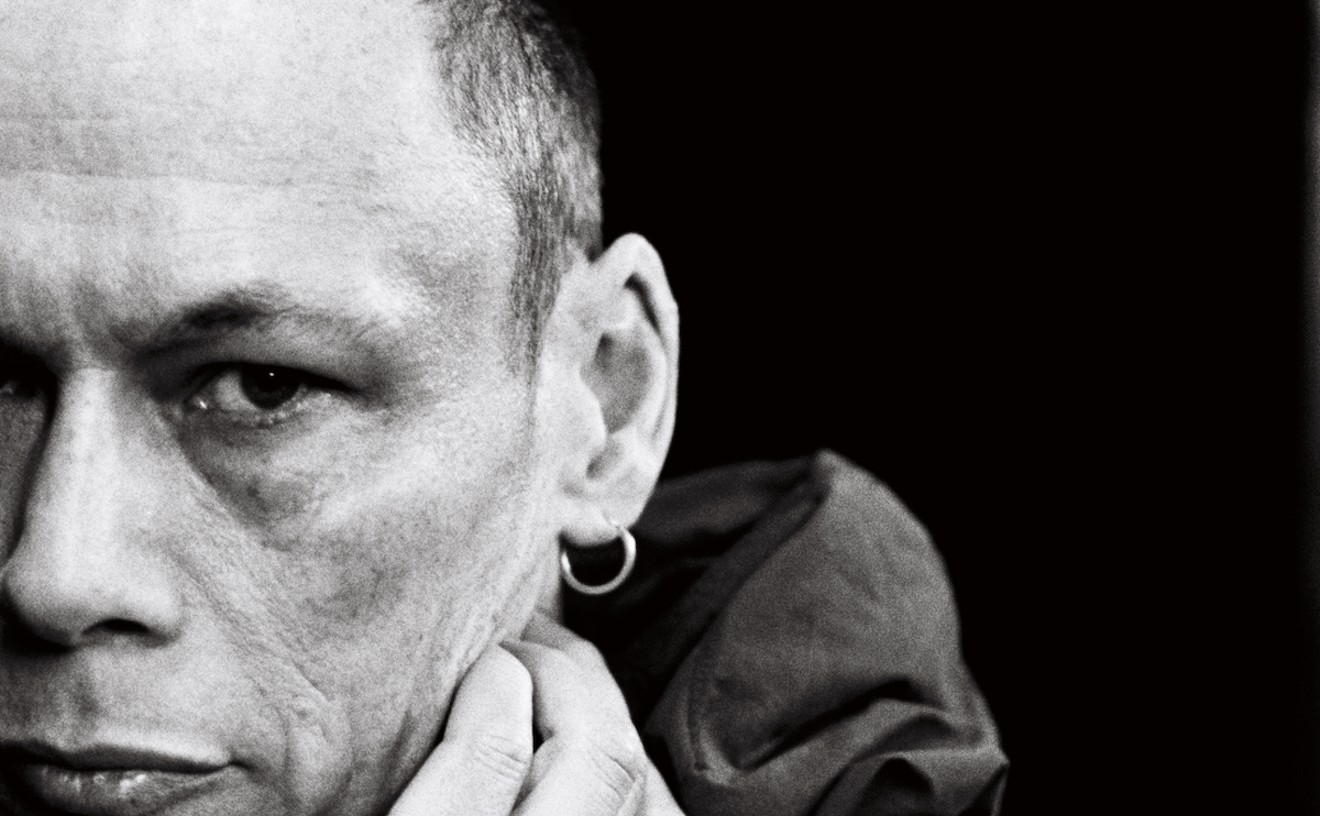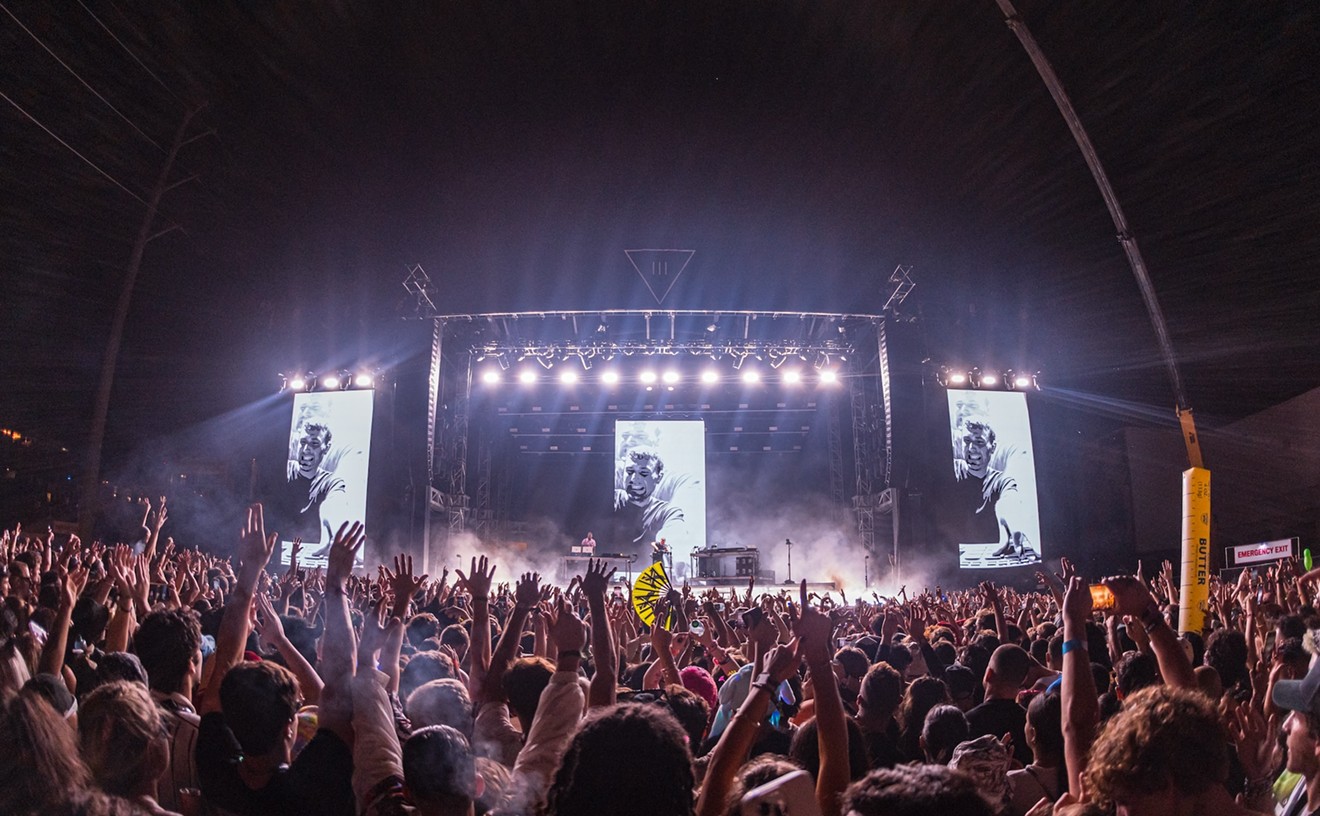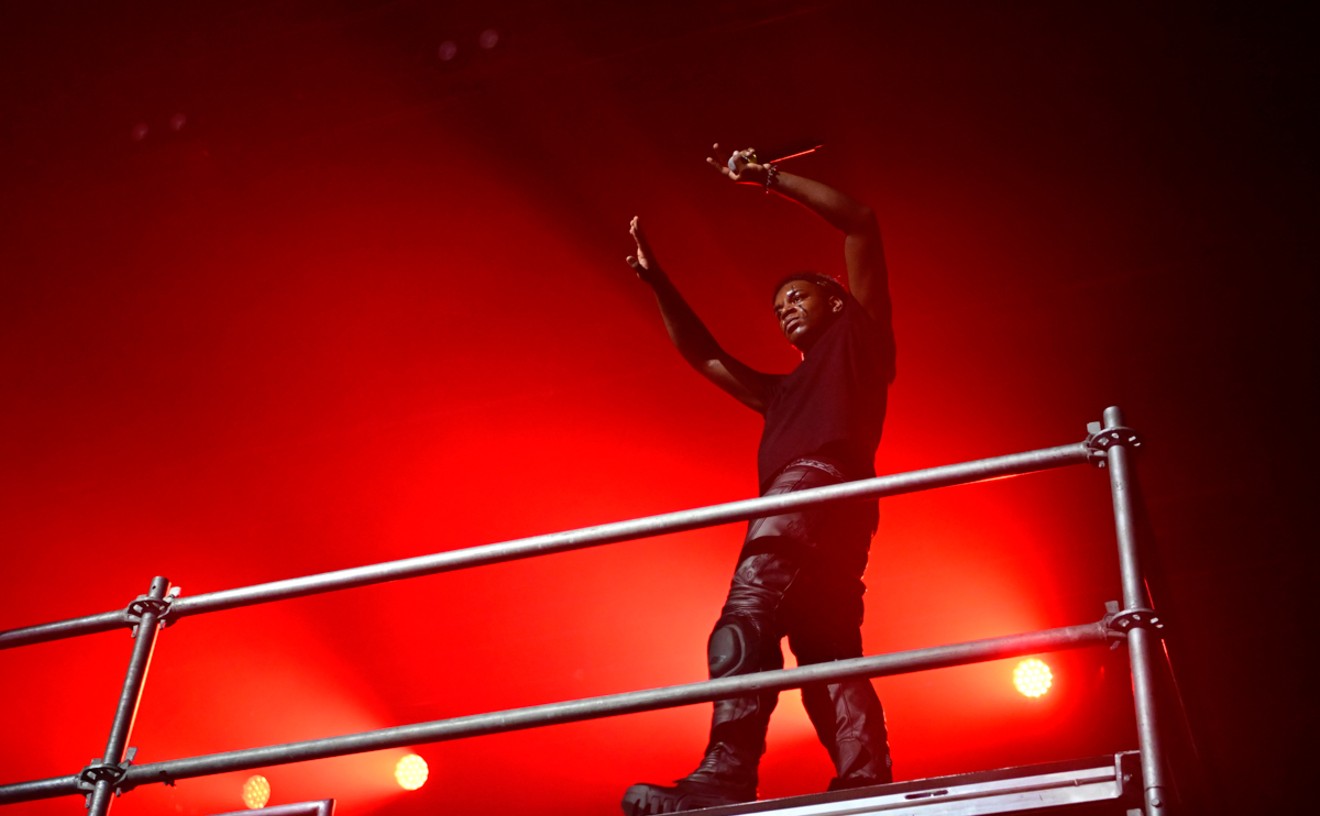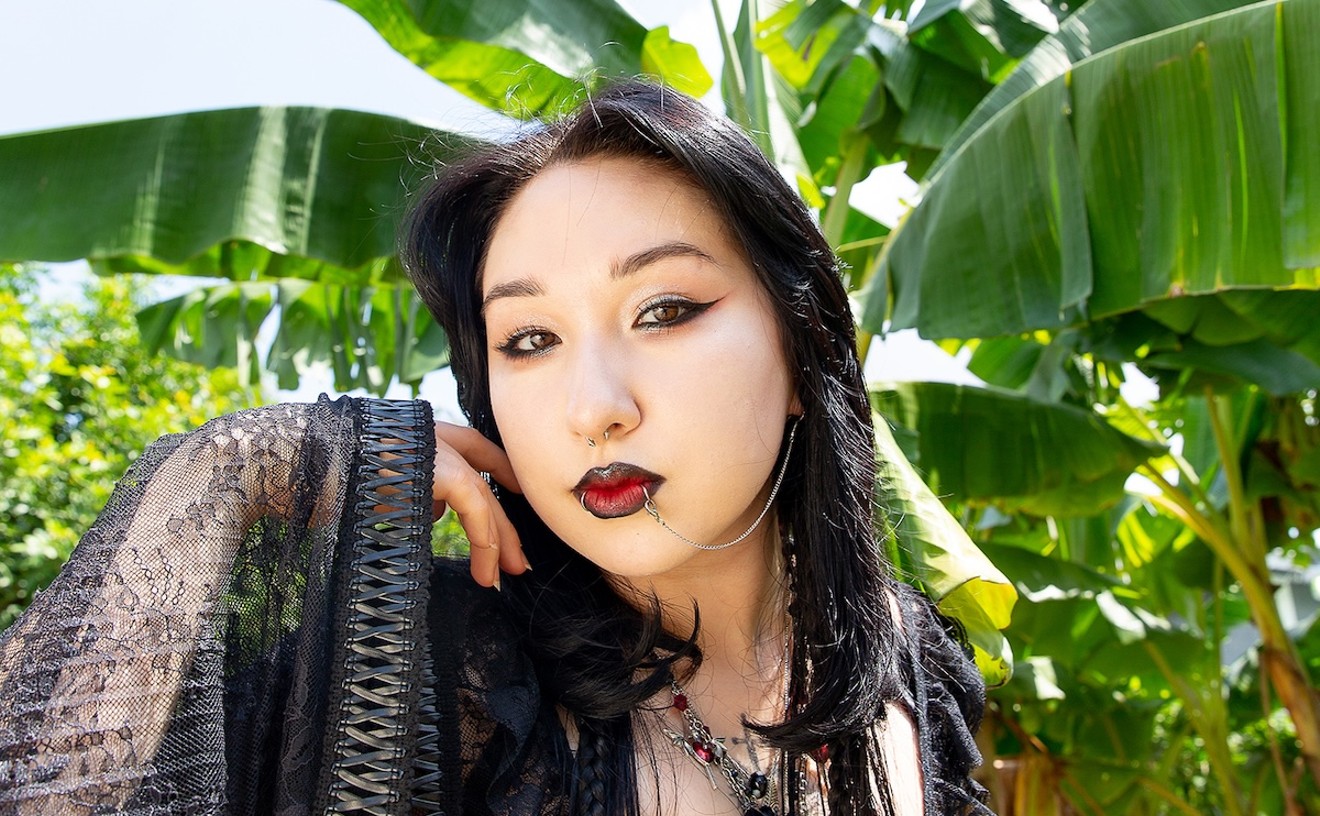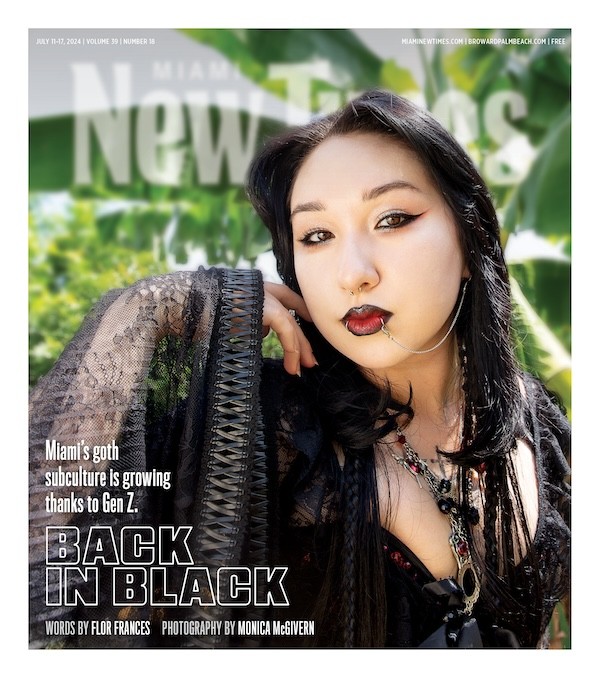Upon pulling up into a warehouse park, you know you're in the right place when you spot the throngs of twentysomethings rocking their finest clubwear. Some are in button-downs and tight jeans; others sport torn fishnets and knee-high boots. They’re all talking, laughing, slamming tallboys, and walking in the same direction — seemingly toward nowhere.
Miami-Dade's western fringes have historically been home to nightlife endeavors like strip clubs and dive bars, but proper nightclubs have always been the domain of the area's urban core. The Boombox bucks that trend by regularly hosting events that rival those of more well-known nightclubs — both in terms of attendance and quality of music. And it's tucked away where you’d least expect it.
"We like to think of ourselves as the bridge between pure underground and the limelight," says Laszlo Kristaly, the venue's co-owner who's sporting Nike overalls, a turquoise mohawk, and a super-reflective pair of caravan sunglasses. "The Boombox is a place where stars are born. A lot of people who started performing with us are now playing Space on a regular basis. It's cool — they reached the other side."
There’s something furtive about this place. From outside, the music is barely discernible until you’re in line to enter. Two girls in matching T-shirts with the word "security" emblazoned on them check tickets, but unlike venues in downtown or Miami Beach, the wait to get in rarely lasts more than ten minutes, even at peak hours.
Upon entering, the first section you'll encounter is the patio. Affectionately dubbed “the Lot,” the venue's industrial walls are bombed with graffiti, with fresh paint overlapping older, faded pieces. The energy from the DJ booth radiates outward, toward patrons seated at picnic tables under the moonlight. They’re talking to strangers, smiling, exchanging shooters of liquor, rolling joints.
“Once it goes from graffiti to street art and when the [Miami Parking Authority] starts charging for parking, the prices go up,” Kristaly says jokingly. “That’s when things start getting real, you know?”

Miguel Cala (left), Ricardo "Mango" Cano, and Laszlo Kristaly opened the Boombox after feeling disappointed with the city's nightlife scene.
Photo by Daniel Lugo/@daniellugo767
Ghetto Blaster
Before he was old enough to drink, Kristaly, along with longtime friend Miguel Cala and Kristaly's cousin, Ricardo "Mango" Cano, threw parties for underage suburbanites. Starting with high-school gatherings in Kristaly’s parents’ house, the trio eventually began hosting events at local businesses and warehouses. The nights were often chaotic to organize but always fun.As Kristaly, Cala, and Cano watched the demand for their events grow, they decided it was time to open a venue of their own. With their own space, they saw an opportunity to provide Miami with the closest thing to an underground clubbing experience while remaining on the right side of the law.
While the location and mission are humble, the Boombox is far from short on impressive performers. On this night in March, the venue is playing host to Boiler Room-level DJs like Ben UFO, Danny Daze, and Pearson Sound on the outdoor patio.
The venue's indoor space, dubbed "the Box," consists of a giant room that grows infinitely hazy as the night rages on. Here you'll encounter local DJs dishing out the pulsating grooves for dancers to lose themselves in. At one point, a young woman takes a break from dancing to find a corner to puke in — though the fog and low, purple lighting allow for some obfuscation of what's occurring. Once she collects herself, she's back on the dance floor, acting surprisingly lucid, nodding her head and shuffling through rhythmic chaos."We like to think of ourselves as the bridge between pure underground and the limelight."
tweet this
"Miami is known for its club culture, but the nightlife scene here is super different from what we do at the Boombox," says Cano, who's rocking a vintage BMW windbreaker and puffing on a disposable vape. "It's the perfect mix of vibes between punk shows, warehouse raves, and a night out at Space."
Cano and Kristaly, music- and graffiti-obsessed cousins, have been close since they were students at Doral Academy. (Considering they are both 22, that wasn't too long ago.)
"Laszlo used to pull up to school with his boombox," Cano says. "We used to sit outside blasting music. I think administration cut us some slack because they thought it was cool to see these jits bumping old-school hip-hop like N.W.A., A Tribe Called Quest, and Nas, outside with a boombox."
"I eventually got expelled from Doral Academy for 'conspiracy of vandalism,'" Kristaly admits. "I gave some kids spray paint, they ended up tagging inside the school. Everyone blamed it on me, but I don't mind. I ended up at South Miami Senior High, and some of Miami's best DJs went to South Miami."
Between their banter, rumination on the past, and hits from a shared dab pen, Kristaly and Cano prove themselves to be quintessential Miamians, growing up in the very suburban area where the Boombox is located. (At the partners' request, New Times is not disclosing the Boombox's exact location.)
"I remember my friends and I used to skip school all the time and go over to this little warehouse park to smoke weed, do graffiti — all our little activities," Kristaly says. "I think it's funny that we're throwing these huge parties there now, making a name for ourselves. It all came full circle."
"People still do graffiti there," Cano adds. "Our spot has gotten hit a couple of times. It's cool to see there are still kids on a mission."
Press Fast-Forward
Back in 2019, the guys were putting on a series of events under the name Rewind. They staged their first show at Roots Miami Kava Bar & Eatery in Little Haiti, with local acts on the bill alongside indie-rock outfit Mustard Service, which Cano had seen onstage at his high school.“Mustard Service performed at the Doral Academy before their first album dropped,” he recounts. “I was finally hearing local music. I saw Mustard Service as a big deal, even then. It was motivational to know that not only were these people from my city, but they weren’t much older than me and they were doing what I wanted to do.”
Early on in their careers as event promoters, Kristaly, Cano, and Cala were met with obstacles every time they wanted to put on an event. One of their earliest shows almost got canceled owing to logistical hurdles after a friend offered a warehouse space for the night.
“He had a warehouse somewhere in Doral that he was going to let us use for a show,” Cano says. “It belonged to his uncle, but when the uncle realized we were throwing a party, he started worrying about the cops and said we couldn’t use the space. It was the day of the show.”
Frantic calls to local venues led the partners to Up 2 Something Studios in Wynwood. Though the show was a success, they felt it was time they found a space to call their own.
Kristaly’s father had already planted the idea of a venue years before, when he noticed his son was so into music.
“My dad has been super-helpful in guiding us,” Kristaly elaborates. “A long time ago, he mentioned how it would be sick to have a place called the Boombox and to make it, like, a square space with really big speakers and shit.”
In October 2019, Kristaly, Cano, and Cala secured a space not far from the Boombox's current location.
“Where we’re at now is actually our second location. For a couple of months, we were using this small warehouse that my friend’s band kept as a rehearsal space.” Cano explains. “The band broke up, and we sort of subleased the place without telling the landlord. Eventually, we met him, and it was cool. That place was for real a box, like a straight-up cube. The walls were all black and the name just fit. We kind of ran with that, sketched out a logo, and started throwing bigger parties.”
Then came the pandemic. The friends had to postpone an event, Operating System 1.0, for which Australian DJ/producer Jensen Interceptor had been tapped as the night's headliner. (The show eventually took place nearly two years later, on February 25 of this year.) The final show at the Boombox’s original warehouse was staged on March 14, 2020, and featured South Florida rapper Aster the Gemini."We're not the most professional place, but we're more professional than your average DIY venue."
tweet this
With 2020 in disarray, the up-and-coming impresarios focused on renting and renovating a bigger space. They spent the year holed up, crafting the Boombox. The new space's first show was held on New Year's Day in 2021. It was a scaled-back affair, a party posted about only to their “close friends” list on Instagram. It featured Cano himself, along with local DJs Low Earth Orbit and Flipper.

The Boombox is attracting twentysomething clubgoers looking for an alternative to Miami's nightlife scene.
Photo by Lauren Morrell
In the 2000s, long before Wynwood became the city's de facto arts district, the area was known as the Bird Road Arts District, home to a handful of galleries and artists.
“This warehouse park was a much more prolific arts district, but then it died," Kristaly notes.
The venue's location not only speaks to the partners' roots, but it provides a space to an often-ignored swath of the county. The free and abundant parking surrounding the Boombox is a welcome change of pace, as is the ability to exit and re-enter at will and the orange jugs filled with drinking water for patrons. The venue is also 18-and-over, a stark contrast to Miami's mainly 21-and-over nightlife scene. These might seem like minor details, but for those who know how difficult and expensive it is to orchestrate a night out in Miami, they add up.
"We have a younger crowd, but we like that because we weren't even 21 when we started," Kristaly says. "I'm in this because I like it, not because I'm trying to make a bunch of money. We're not the most professional place, but we're more professional than your average DIY venue. Like a lot of the people who perform at the Boombox, we're learning as we go."
Barely Legal
The Boombox is far from the first DIY warehouse event space in Miami. Places like this have been popping up and getting shut down for years. In March, cops raided a punk show at the Hotbox, the warehouse across the street from the Corner in downtown Miami. Before that, there was Drip Gallery in Allapattah, and before that, Space Mountain at the edge of Liberty City. The Boombox is often compared to Warehouse 229, an event space in Little Haiti that held raves until its closure in 2019."I want people coming in questioning whether the place is legal or not," Kristaly says. "What's cool is that we are actually just as legal as Space or ATV."
Indeed, entering the Boombox feels like stumbling onto an event that doesn't seem entirely legit. Until recently, the venue had been operating under a special event permit that had to be issued for each show — thus the Boombox's infrequent scheduling of events.
"The reason why a lot of DIY places that are reminiscent of the Boombox get shut down is that they aren't doing things legally," Cano notes. "We don't want that to happen to us.""The Boombox was born out of frustration for how things are in Miami nightlife."
tweet this
Despite operating legally, the Boombox doesn't give out its location unless you buy a ticket — though it’s not that hard to find.
Back in March, around 3 a.m., police cars appeared outside the Boombox, lights flashing. A few minutes after speaking with security outside the venue, the officers returned to their vehicles and drove away.
“Yeah, the cops know what’s up,” Kristaly says. “They know there isn’t anything too crazy going on here. They just like to poke around sometimes.”
A March 19 blowout served as the last show at the Boombox until its return later this year. During the downtime, Kristaly and Cano are working to fully legitimize the venue in the eyes of the law, allowing it to operate with more regularity.
"In the next few months, we're going to legalize the spot completely," Kristaly explains. "We're going to have a nightclub license, and we're going to be open on a much more regular basis."
While some may bemoan the venue's growth into a legitimate endeavor, its out-of-the-way locale pretty much guarantees the spot will continue to be a locals-only venue and alternative to a night out in the urban core.
"The Boombox was born out of frustration for how things are in Miami nightlife. If you think about the origins of discotheques, they were created by gangsters to wash their money [and] sell more product," Kristaly says. "The expensive drinks, flashy clothes — they have a history rooted in crime and money. But we're trying to separate ourselves from that."
"On paper, we may be a nightclub, but we don't want to act like one," he adds. "We want it to feel more like a rave. A place where stars are born."

